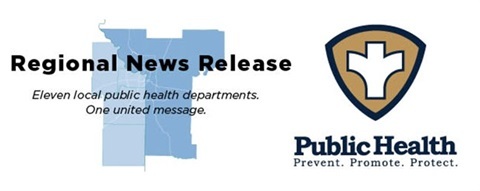. | .
. | .
Experts recommend getting flu and COVID-19 vaccinations before the holidays and taking precautions to reduce the spread of RSV and other respiratory illnesses during National Influenza Vaccination WeekJoint Press Release - 12/9/2022
Summary:
Amid a steep increase in respiratory illnesses across the region, local public health departments are reminding Kansas City metro residents that getting an annual flu shot and COVID-19 booster, along with wearing a mask, are the best ways to stay healthy and protect loved ones from illness now and into the holidays. They are also urging people to take precautions to protect themselves and reduce the spread of respiratory illnesses in our region, including staying home when sick and washing hands frequently.Hospitals in the metro are reporting rising numbers of flu, RSV and COVID-19 cases. Health care providers and hospitals are busy helping these patients, leading to longer wait times and crowded emergency rooms.
“We are seeing a lot of sick kids each day — the respiratory illness season started earlier than usual and is hitting our region hard,” said Dr. Jennifer Watts, Chief Emergency Management Medical Officer with Children’s Mercy Kansas City. “Like many pediatric hospitals, Children’s Mercy has been at or near capacity and we have not yet reached the peak of flu cases this winter.”
Public health experts say eligible people 6 months of age and older should get an annual flu vaccine. Vaccines are widely available across the Kansas City region. Contact your primary health care provider, pharmacy or local public health department to check your eligibility and get your flu shot, or visit vaccines.gov to find a flu vaccine provider near you.
Every year, flu vaccination prevents illnesses, medical visits, hospitalizations and deaths. While some people who get vaccinated still get sick, flu vaccination has been shown to reduce the severity of illness. People at higher risk of serious flu complications include young children; pregnant people; people with certain chronic health conditions like asthma, diabetes or heart and lung disease; and people 65 years and older.
“This is one of the worst flu seasons we’ve seen in recent years. Now is a good time to get your flu vaccine before people gather for the holidays,” said Juliann Van Liew, MPH, Director of the Unified Government Public Health Department. “While you’re getting your flu shot, you can also get your COVID-19 vaccine or booster. It’s safe to get both at the same time. Beyond vaccination, it’s also important for us to take more precautions for the time being, like wearing masks and staying home when we are sick. It’s small steps like this that will get us through the surges of these respiratory illnesses and come out on the other side with fewer people who have been seriously ill or even lost their lives.”
Influenza and COVID-19 are both contagious respiratory viruses. According to the Centers for Disease Control and Prevention (CDC), COVID-19 spreads more easily than the flu and can cause more severe illness in some people. Both viruses can cause similar symptoms, such as fever, cough, shortness of breath and fatigue.
“COVID-19 is still present in our region and cases are expected to increase this winter. Thankfully, we know what actions people can take to slow the spread of COVID-19, as well as RSV, flu and other respiratory illnesses: get vaccinated and boosted when eligible, wear a mask, stay away from crowds, wash hands frequently and stay home if sick,” said Gary Zaborac, MS, Director of the Clay County Public Health Center.
Updated COVID-19 boosters that protect against the Omicron variant are authorized for people ages 5 and older. Visit vaccines.gov to find a COVID-19 vaccine provider near you or contact your local public health department.
The CDC recommends that people ages 5 years and older receive one updated (bivalent) booster two months after their last COVID-19 dose or booster. If you have questions about the COVID-19 vaccine or your eligibility, please contact your primary health care provider, pharmacy or local public health department. Learn more about staying up to date on your COVID-19 vaccine at the CDC website.
Public health experts in the region are concerned that a declining number of adults 65 and older have received the bivalent COVID-19 booster. With the holiday season under way – and the inevitable family gatherings – it is important that older adults take advantage of this tool.
Kansas City metro residents can also visit PrepareMetroKC.org , the region’s emergency preparedness website, to find more information about illness prevention.
Original source can be found here.

 Alerts Sign-up
Alerts Sign-up